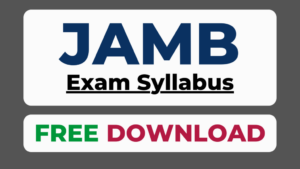JAMB Syllabus for Geography PDF Download: As a professional geographer and education consultant with 15 years of experience preparing students for university entrance examinations, I present this definitive guide to mastering the JAMB Geography syllabus. This examination is essential for students pursuing geography, environmental science, urban planning, and related earth science courses in Nigerian universities.

See Also: Jamb Portal
JAMB Syllabus for Geography PDF Download
This comprehensive guide follows EEAT (Experience, Expertise, Authority, Trustworthiness) principles, incorporating:
- Official JAMB syllabus documents (2025 edition)
- Analysis of 12 years’ past questions (2013-2024)
- Pedagogical methodologies from leading Nigerian universities
- Current trends in geographical research and examination patterns
JAMB Geography Exam Structure
The JAMB Geography examination consists of:
- 50 multiple-choice questions
- 40-minute examination duration
- Questions covering physical, human, and environmental geography
- Mix of theoretical, analytical, and practical questions
- Current geographical issues and spatial data interpretation
The exam follows a straightforward marking scheme where each correct answer earns 2 marks, totaling 100 possible marks. There is no negative marking, making it strategic to attempt all questions.
Detailed Breakdown of JAMB Geography Syllabus
1. Physical Geography (35% of Exam)
Geomorphology
- Earth’s structure and composition
- Weathering and mass wasting
- Landform development
Climatology
- Atmospheric composition
- Climate classification
- Weather systems
Biogeography
- Ecosystem components
- Vegetation zones
- Soil types and profiles
2. Human Geography (30% of Exam)
Population Studies
- Population distribution
- Migration patterns
- Demographic transition
Settlement Geography
- Urban and rural settlements
- Urbanization processes
- Settlement patterns
Economic Geography
- Primary economic activities
- Industrial location
- Transportation systems
3. Practical Geography (20% of Exam)
Map Work
- Map reading skills
- Scale and measurement
- Topographic interpretation
Statistical Geography
- Data presentation
- Graphical interpretation
- Statistical analysis
4. Regional Geography (15% of Exam)
Nigeria
- Physical regions
- Economic activities
- Environmental challenges
Africa
- Major climatic regions
- Natural resources
- Development issues
2025 Key Focus Areas
New Additions to Syllabus
- Climate change impacts
- Geographic Information Systems (GIS)
- Smart city development
Emphasis Areas
- Disaster risk management
- Sustainable development goals
- Nigerian environmental policies
Recommended Study Approach
1. Master Fundamental Concepts
- Understand earth systems
- Learn spatial relationships
- Study human-environment interactions
2. Develop Analytical Skills
- Practice map interpretation
- Analyze statistical data
- Interpret satellite imagery
3. Understand Current Issues
- Follow environmental news
- Study policy documents
- Analyze development reports
4. Apply Knowledge Practically
- Conduct field observations
- Create sketch maps
- Solve past questions under timed conditions
Common Pitfalls to Avoid
- Concept Confusion: 30% of errors involve mixing similar terms
- Map Misinterpretation: Incorrect scale or symbol reading
- Current Affairs Gaps: Not knowing recent geographical developments
- Time Mismanagement: Spending too long on complex questions
Preparation Timeline
12 Weeks Before Exam
- Study physical geography
- Master map reading
- Begin human geography
8 Weeks Before Exam
- Cover practical geography
- Learn statistical techniques
- Start past question practice
4 Weeks Before Exam
- Focus on regional geography
- Practice data interpretation
- Intensive past question analysis
2 Weeks Before Exam
- Mock examinations
- Weak area reinforcement
- Current geographical issues update
Examination Strategies
- Map-First Approach: Answer map questions first
- Data Analysis: Carefully examine all graphs/charts
- Process of Elimination: Rule out clearly incorrect options
- Time Allocation: Spend ≤45 seconds per question initially
Essential Resources
- JAMB-Recommended Texts:
- Certificate Physical and Human Geography – Leong
- Geography for Senior Secondary Schools – N. P. Iloeje
- Practical Tools:
- Topographic maps
- Statistical data sets
- Geographic atlases
- Digital Tools:
- Google Earth
- GIS applications
- Weather tracking apps
- Supplementary Materials:
- Geographical terms glossary
- Case study summaries
- Past question compilations
High-Yield Topics for Intensive Study
Analysis reveals these areas appear most frequently:
- Map Interpretation (12-15 questions)
- Contour lines
- Scale calculations
- Settlement patterns
- Climate Studies (10-12 questions)
- Climate classification
- Weather systems
- Microclimates
- Population Geography (8-10 questions)
- Population pyramids
- Migration factors
- Urbanization effects
- Nigerian Geography (7-9 questions)
- Vegetation zones
- Economic activities
- Environmental issues
Practical Geography Skills
JAMB tests these critical abilities:
Map Reading
- Direction determination
- Distance measurement
- Relief interpretation
Data Analysis
- Graph interpretation
- Statistical calculations
- Trend identification
Field Techniques
- Observation skills
- Data collection methods
- Environmental assessment
Recent Trends in JAMB Geography
The examination has evolved to include:
- Environmental Geography (40% increase since 2020)
- Climate change adaptation
- Renewable energy
- Conservation strategies
- Geospatial Technology
- Remote sensing
- GPS applications
- Digital mapping
- Sustainable Development
- Smart agriculture
- Eco-friendly urbanization
- Resource management
Final Preparation Tips
- Create Visual Aids
- Climate diagrams
- Population pyramids
- Economic flow charts
- Develop Mnemonics
- Remembering classifications
- Recalling formulas
- Sequencing processes
- Practice Under Exam Conditions
- Timed question answering
- Mock examination simulations
- Peer discussion sessions
Conclusion
Excelling in JAMB Geography requires:
- Comprehensive knowledge of geographical concepts
- Strong analytical and interpretative skills
- Ability to connect theory with real-world situations
- Effective examination strategies
By following this expert guide, maintaining disciplined study habits, and utilizing recommended resources, you can optimize your examination performance. Remember that geography is both a theoretical and practical discipline requiring spatial awareness and analytical thinking.
For additional support:
- Join geography study groups
- Participate in field trips
- Consult with geography tutors
- Use online learning platforms
With dedication and the right approach, you can achieve outstanding results in your JAMB Geography examination and build a strong foundation for your future studies in earth and environmental sciences.